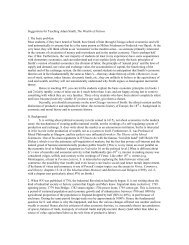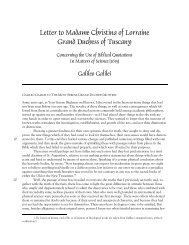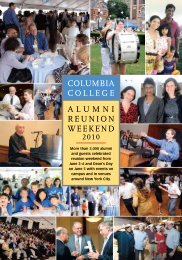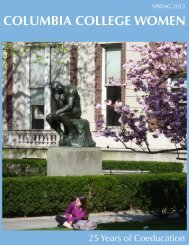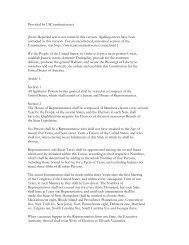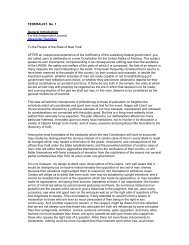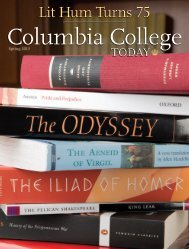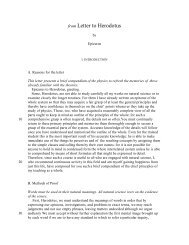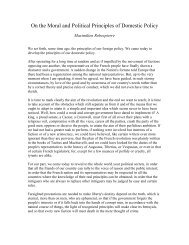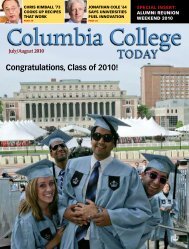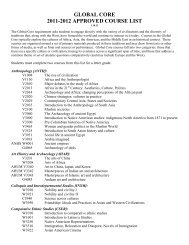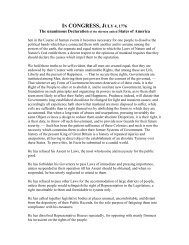Download this issue as a PDF - Columbia College - Columbia ...
Download this issue as a PDF - Columbia College - Columbia ...
Download this issue as a PDF - Columbia College - Columbia ...
You also want an ePaper? Increase the reach of your titles
YUMPU automatically turns print PDFs into web optimized ePapers that Google loves.
Volume 40 Number 4<br />
Summer 2013<br />
EDITOR AND PUBLISHER<br />
Alex Sachare ’71<br />
EXECUTIVE EDITOR<br />
Lisa Palladino<br />
MANAGING EDITOR<br />
Alexis Tonti ’11 Arts<br />
EDITORIAL ASSISTANT<br />
Elena Hecht ’09 Barnard<br />
FORUM EDITOR<br />
Rose Kernochan ’82 Barnard<br />
CONTRIBUTING WRITER<br />
Shira Boss ’93, ’97J, ’98 SIPA<br />
EDITORIAL INTERN<br />
Karl Daum ’15<br />
DESIGN CONSULTANT<br />
Jean-Claude Suarès<br />
ART DIRECTOR<br />
Gates Sisters Studio<br />
CONTRIBUTING PHOTOGRAPHERS<br />
Chris Balmer ’07<br />
Eileen Barroso<br />
Gene Boyars<br />
Michael Dames<br />
Peter Foley<br />
Bruce Gilbert<br />
Leslie Jean-Bart ’76, ’77J<br />
Natalie Keyssar<br />
Char Smullyan<br />
Published quarterly by the<br />
<strong>Columbia</strong> <strong>College</strong> Office of<br />
Alumni Affairs and Development for<br />
alumni, students, faculty, parents and<br />
friends of <strong>Columbia</strong> <strong>College</strong>.<br />
SENIOR EXECUTIVE DIRECTOR<br />
OF ALUMNI AFFAIRS<br />
Bernice Tsai ’96<br />
Address all correspondence to:<br />
<strong>Columbia</strong> <strong>College</strong> Today<br />
<strong>Columbia</strong> Alumni Center<br />
622 W. 113th St., MC 4530, 6th Fl.<br />
New York, NY 10025<br />
212-851-7852<br />
Email (editorial): cct@columbia.edu;<br />
(advertising): cctadvertising@columbia.edu.<br />
Online: college.columbia.edu/cct and<br />
facebook.com/alumnicc.<br />
ISSN 0572-7820<br />
Opinions expressed are those of the<br />
authors and do not reflect official<br />
positions of <strong>Columbia</strong> <strong>College</strong><br />
or <strong>Columbia</strong> University.<br />
© 2013 <strong>Columbia</strong> <strong>College</strong> Today<br />
All rights reserved.<br />
Letters to the Editor<br />
Keeping the Spirit Alive<br />
Congratulations to the CCT staff for creating<br />
an alumni magazine that h<strong>as</strong> kept<br />
alive the spirit of intellectual curiosity and<br />
exploration that h<strong>as</strong> been such an important<br />
part of what <strong>Columbia</strong> h<strong>as</strong> stood for<br />
through the years and, in particular, for<br />
your two most recent <strong>issue</strong>s celebrating<br />
“the Pride of the Lions” and the Core Literature<br />
Humanities course.<br />
Dr. Howard B. Levine ’64<br />
Brookline, M<strong>as</strong>s.<br />
The Winter 2012–13 <strong>issue</strong> w<strong>as</strong> the very best<br />
I have seen, perhaps ever. Good work.<br />
Dr. Paul Erik Gorrin ’63<br />
Milford, Del.<br />
Lit Hum @ 75<br />
Time flies. Value stays.<br />
Lit Hum started in 1938. I took it <strong>as</strong> a<br />
freshman in 1939 and again in my sophomore<br />
year.<br />
Initially I w<strong>as</strong> annoyed to have a course<br />
imposed on me, then entranced.<br />
I have kept all the books. The binders<br />
are cracked and the pages yellow — but<br />
the contents priceless.<br />
Cedric Philipp ’43<br />
Audubon, Pa.<br />
I don’t think I’ve ever read <strong>as</strong> large a percentage<br />
of an <strong>issue</strong> of <strong>Columbia</strong> <strong>College</strong><br />
Today <strong>as</strong> I did of the [Spring 2013] <strong>issue</strong><br />
about the anniversary of Lit Hum.<br />
My memories of <strong>this</strong> cl<strong>as</strong>s are somewhat<br />
painful: Reading a book a week w<strong>as</strong><br />
difficult for me, often impossible. But despite<br />
my not having completed all these<br />
great works, I would not trade the experience<br />
for anything. I am convinced that I<br />
am a better scientist and person for having<br />
been exposed to these books and the discussions<br />
they generated.<br />
Each year, when we are evaluating applicants<br />
to medical or graduate school at<br />
the University of Michigan, where I am<br />
a member of the faculty, I pay special attention<br />
to whether they have [studied] a<br />
broad liberal arts curriculum. I find that if<br />
a student’s cl<strong>as</strong>ses have almost exclusively<br />
been in the hard sciences, they lack some<br />
of the maturity that I think bodes well for<br />
success in graduate or professional school.<br />
<strong>Columbia</strong> should be proud of <strong>this</strong> tradition.<br />
I look forward to celebrating the<br />
100th anniversary.<br />
Mike Imperiale ’76, ’81 GSAS<br />
Ann Arbor, Mich.<br />
I w<strong>as</strong> deeply influenced by the Humanities<br />
courses; I had never read most of the<br />
authors we were exposed to nor w<strong>as</strong> I familiar<br />
with their ide<strong>as</strong>.<br />
I w<strong>as</strong> lucky enough to have two great<br />
teachers — very different, but both stimulated<br />
my mind <strong>as</strong> nothing before. James<br />
Gutmann [Cl<strong>as</strong>s of 1918, ’36 GSAS] w<strong>as</strong> a<br />
kind and gentle scholar who pushed the<br />
cl<strong>as</strong>s to think for itself and guided us so<br />
gently we didn’t realize how much we<br />
were learning. He had us to his apartment<br />
for tea and cookies and reminded us there<br />
w<strong>as</strong> a world outside the <strong>College</strong>. Mark Van<br />
Doren [’21 GSAS] w<strong>as</strong> a brilliant scholar<br />
and he did not suffer fools lightly. We were<br />
reading The Odyssey and someone in the<br />
cl<strong>as</strong>s said Odysseus w<strong>as</strong> an “arrogant”<br />
man. Van Doren looked at him and said,<br />
“All great men are arrogant. I myself am<br />
arrogant.” The inference w<strong>as</strong> not missed by<br />
any of us.<br />
I took many other fine courses with<br />
great teachers such <strong>as</strong> James Shenton [’49,<br />
’54 GSAS], Moses Had<strong>as</strong> [’30 GSAS] and<br />
Wm. Theodore de Bary [’41, ’53 GSAS]<br />
and w<strong>as</strong> deeply influenced by all of them.<br />
I received an amazing education at <strong>Columbia</strong>,<br />
but Lit Hum w<strong>as</strong> the first [course]<br />
to open my eyes to the wonderful world I<br />
now enjoy.<br />
Dr. Carl Norden ’56<br />
Philadelphia<br />
Contrary to the self-congratulatory tone<br />
of the Lit Hum 75th anniversary <strong>issue</strong><br />
[Spring 2013], my most vivid Lit Hum<br />
memory w<strong>as</strong> standing in front of Low<br />
Library holding a paperback edition of<br />
something or other in my hand and wondering<br />
how I would get through 450 pages<br />
of fairly dense reading in a week — and if I<br />
did, how I would remember any of it.<br />
Russ Abbott ’62<br />
Culver City, Calif.<br />
The series on Lit Hum in the Spring 2013<br />
<strong>issue</strong> is excellent. I shall be forever grateful<br />
for the Core Curriculum. It w<strong>as</strong> then that<br />
my education truly began.<br />
Having said that, I have always regretted<br />
that only Western Civilization w<strong>as</strong><br />
covered. The world ended in Greece. The<br />
rich and manifold cultures, politics, economics<br />
and religions of the Near, Middle<br />
and Far E<strong>as</strong>t were ignored. In that silence,<br />
those regions were tacitly relegated to unimportance<br />
and I, for one, left with that<br />
mindset. If the world ended in Greece for<br />
<strong>Columbia</strong> graduates, the same limited<br />
perspective might well have been shared<br />
by graduates of other schools with their<br />
even narrower curricula. The history of<br />
the l<strong>as</strong>t century and <strong>this</strong> one so far h<strong>as</strong><br />
shown the huge importance of the world<br />
beyond Greece. Most of today’s headlines<br />
deal with events in those regions.<br />
One wonders whether more broadly educated<br />
college graduates of my day might<br />
have produced better managers of world<br />
affairs than the less than brilliant record of<br />
the West in the 20th century — and the 21st,<br />
too, so far.<br />
Dr. G.J. D’Angio ’43<br />
Philadelphia<br />
I enjoyed CCT Editor Alex Sachare ’71’s<br />
“Reevaluating My Lit Hum Experience”<br />
[Within the Family, Spring 2013]. Even if<br />
you read the books more fully, there is always<br />
a desire to re-read the Core.<br />
My CC ’92 next door neighbor from<br />
first year and I hatched a plan that at 70 we<br />
would retake both CC and Lit Hum. Recently<br />
we were emailing regarding <strong>this</strong> fant<strong>as</strong>y<br />
subject and hoping the <strong>College</strong> doesn’t go<br />
all online by then. For us, half of the experience<br />
is the reading; the other half is being in<br />
a cl<strong>as</strong>sroom with a professor and the other<br />
<strong>Columbia</strong> <strong>College</strong> students. The diversity<br />
of philosophical thinking in those intimate<br />
cl<strong>as</strong>sroom [settings] generated discussions I<br />
will never forget.<br />
I regret not reading even more in-depth<br />
than I did at 18; but I don’t ever believe the<br />
college experience is w<strong>as</strong>ted. Those books<br />
read and unread shaped and inspired my<br />
thoughts, fostered dreams realized and<br />
unrealized, and bonded me forever in a<br />
future with a large intellectual community<br />
of thinkers.<br />
James P. Mirollo ’61 GSAS, the Parr Professor Emeritus of English and Comparative Literature,<br />
pauses during a Literature Humanities cl<strong>as</strong>s in 1991. Mirollo w<strong>as</strong> one of the panelists<br />
at the keynote event during the Lit Hum @ 75 celebration on April 26.<br />
PHOTO: NICK ROMANENKO ’82<br />
To <strong>this</strong> day I can spot the <strong>Columbia</strong><br />
<strong>College</strong> graduate because in every field he<br />
or she is known to be the uniquely courageous<br />
voice <strong>as</strong>king the most uncomfortable,<br />
difficult, unanswerable questions. I<br />
believe the Core experience is responsible<br />
for what I describe <strong>as</strong> the CC unpretentious<br />
search for truth.<br />
Jennifer Madrid ’92<br />
Bedford, N.Y.<br />
I enjoyed immensely the latest CCT on the<br />
Core [Spring 2013]. Everyone who h<strong>as</strong> attended<br />
the <strong>College</strong> owes an immense debt<br />
to <strong>this</strong> seminal idea. I w<strong>as</strong> privileged to<br />
extend my Lit Hum experience to “super<br />
Lit Hum,” the “Colloquium on Literature,<br />
Language, Philosophy and History,” in<br />
my junior and senior years.<br />
A student had to be nominated [to take<br />
the cl<strong>as</strong>s] by the Lit Hum faculty. This w<strong>as</strong><br />
a weekly seminar with two University<br />
professors and eight students from different<br />
majors reading works from Gilgamesh<br />
to the Enlightenment the first year, then<br />
through the 20th century for the second<br />
year. My professors included Edward<br />
Said, James Wood and Hugh Amory. We<br />
continue the tradition with a small group<br />
in New Orleans. The University would do<br />
well to revive <strong>this</strong> course.<br />
Dr. Frederick G. Kushner ’70, ’74 P&S<br />
New Orleans<br />
Unlike the ponderous chest-thumping that<br />
filled the Spring 2013 CCT dealing with Lit<br />
Hum history, I am going to take a different<br />
view in offering my memories of my wonderful<br />
time in the course. This memory is<br />
apocryphal and h<strong>as</strong> a necessary touch of<br />
verisimilitude.<br />
I w<strong>as</strong> walking down Broadway from<br />
116th Street to approximately 113th Street<br />
with an armful of clothing for the Greekowned<br />
dry cleaning establishment. Ahead<br />
of me, to my <strong>as</strong>tonishment, w<strong>as</strong> walking<br />
Professor Moses Had<strong>as</strong> [’30 GSAS], the<br />
legendary Lit Hum professor whom I had<br />
heard speak on many occ<strong>as</strong>ions.<br />
Professor Had<strong>as</strong> walked into the dry<br />
cleaning establishment and greeted the<br />
owner. Apparently, they were on familiar<br />
terms.<br />
The owner looked at the garment that<br />
Professor Had<strong>as</strong> had placed on the counter<br />
between them and said, “Euripides”<br />
Without pause, Dr. Had<strong>as</strong> said, “Yes.<br />
Eumenides”<br />
I have never forgotten that brief, poignant<br />
moment.<br />
John Breeskin ’57<br />
Takoma Park, Md.<br />
For more alumni reflections on Literature Human<br />
ities, go to Web Extr<strong>as</strong> at college.columbia.<br />
edu/cct.<br />
(Continued on page 111)<br />
CCT welcomes letters from readers about<br />
articles in the magazine but cannot print or<br />
personally respond to all letters received.<br />
Letters express the views of the writers<br />
and not CCT, the <strong>College</strong> or the University.<br />
Ple<strong>as</strong>e keep letters to 250 words or fewer.<br />
All letters are subject to editing for space<br />
and clarity. Ple<strong>as</strong>e direct letters for publication<br />
“to the editor” via mail or online:<br />
college.columbia.edu/cct/contactus.<br />
SUMMER 2013<br />
4<br />
SUMMER 2013<br />
5



